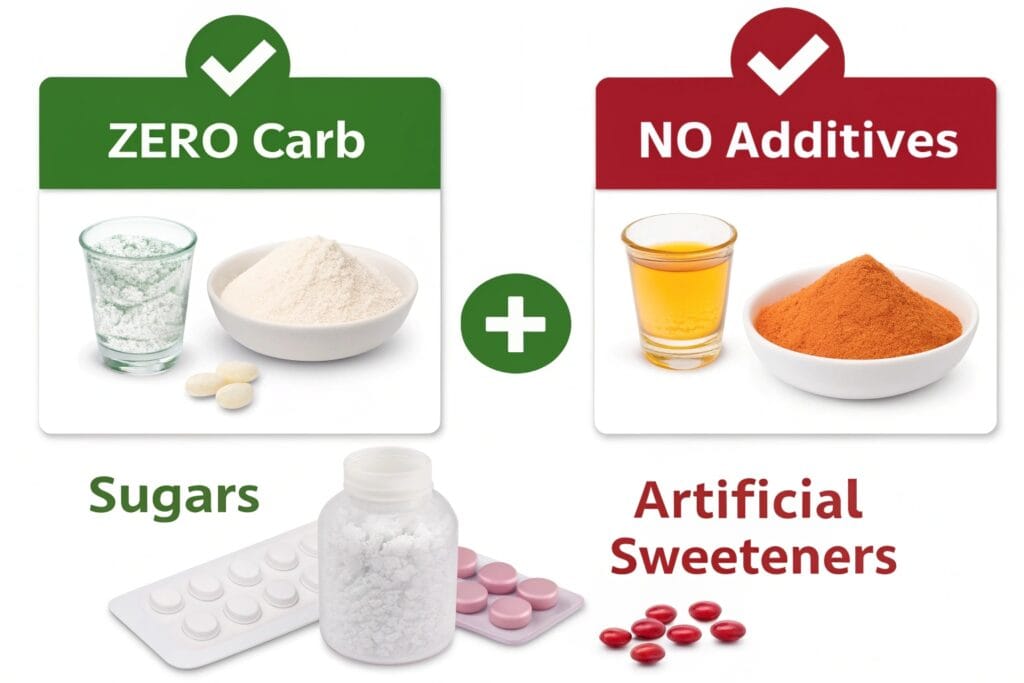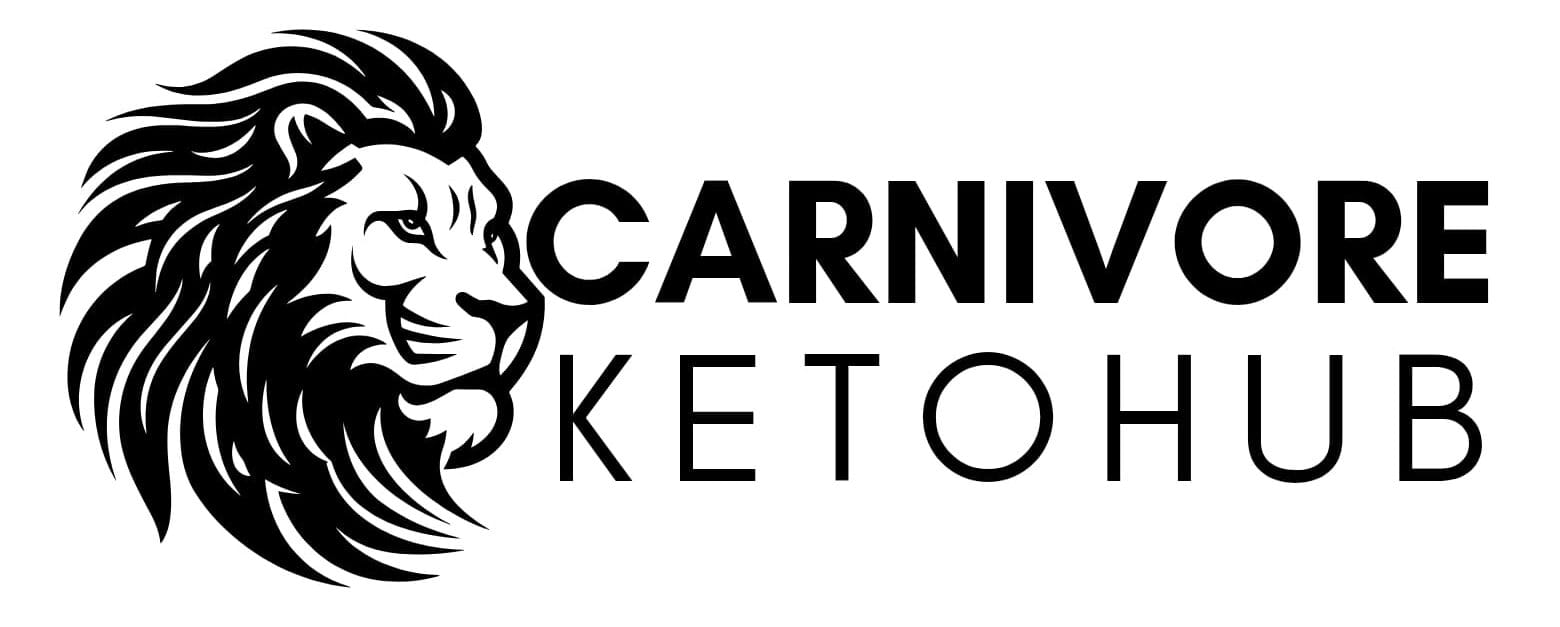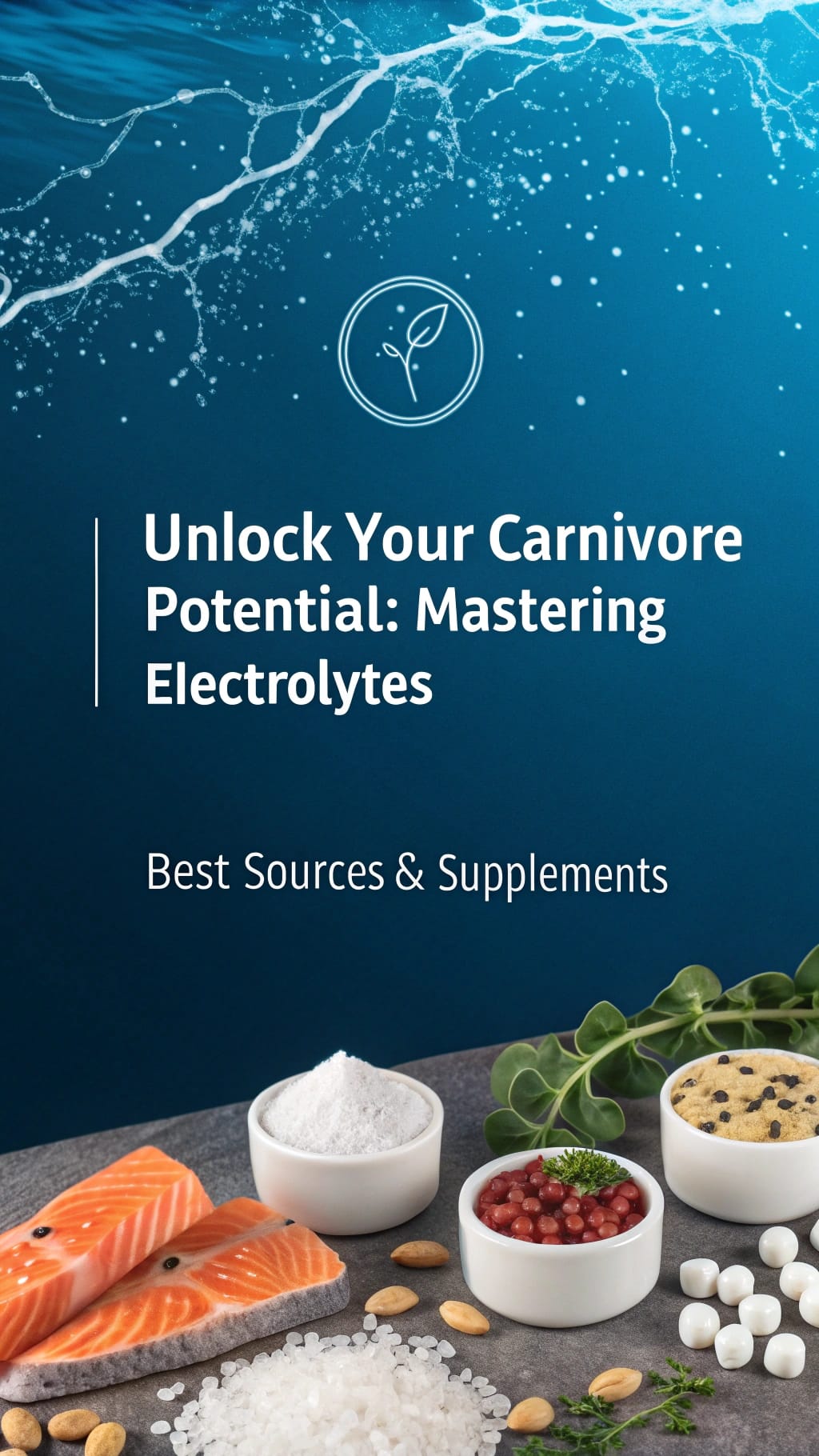Carnivore Diet Electrolytes: Best Sources & How to Stay Balanced
Fatigue, Cramps, Headaches? The Carnivore Adaptation Struggle is Real
Are you feeling exhausted, dealing with muscle cramps, or battling persistent headaches since starting your carnivore journey? You’re not alone. Many carnivore dieters experience these frustrating symptoms, especially during the adaptation phase. While often dismissed as “just part of the process,” these discomforts might be signaling a critical imbalance that’s entirely fixable.
Table of Contents
Beyond the Meat: The Crucial Role of Minerals You Might Be Missing
The transition to a carnivore diet brings profound metabolic changes. While you’re enjoying the benefits of eliminating plant toxins and embracing nutrient-dense animal foods, there’s a hidden challenge many overlook: electrolyte balance. Sodium, potassium, and magnesium—these vital minerals govern countless bodily functions, from energy production to muscle contraction and nerve signaling. When they’re out of balance, your carnivore experience can quickly turn from energizing to exhausting.
This Guide Will Show You:
- Why electrolytes are dramatically depleted on the carnivore diet
- The specific roles of Sodium, Potassium, and Magnesium in your body
- How to obtain these minerals from carnivore-friendly sources
- Why supplementation is often necessary for optimal health
- What to look for in quality electrolyte supplements for carnivore dieters
Disclaimer: This article provides educational information, not medical advice. Always consult with a healthcare provider before making significant dietary changes or starting supplements, especially if you have underlying health conditions.

Why Electrolytes Get Depleted on the Carnivore Diet
The Carnivore Shift: Understanding the Mineral Flush
When you transition to carnivore, your body undergoes major metabolic changes that directly impact your electrolyte status. Understanding these mechanisms explains why simply “eating more meat” isn’t always enough to maintain optimal mineral balance.
Reason 1: Zero Carbs = Lower Insulin = Water & Mineral Loss
On a carnivore diet, your insulin levels naturally decrease. While this is beneficial for many health markers, it has a significant side effect: your kidneys excrete more sodium, and with it, water. This creates a diuretic effect similar to what happens on keto diets.
As your body sheds excess water, it also flushes out essential minerals. This is why many people experience rapid weight loss initially on carnivore—most of it is water weight. Unfortunately, this same process can leave you depleted of crucial electrolytes if not properly managed.
Reason 2: Elimination of Plant-Based Sources
Let’s face it—many traditional sources of potassium and magnesium come from plants. Avocados, spinach, nuts, and bananas are common sources that carnivore dieters eliminate. While meat does contain these minerals, the concentrations in muscle meat may not be sufficient to meet your body’s increased demands during adaptation.
Reason 3: Whole Foods Focus (But Less Variety?)
The carnivore diet emphasizes whole, unprocessed animal foods—a definite plus for overall nutrition. However, the narrower food selection can sometimes lead to mineral gaps, especially if you’re primarily consuming muscle meat without incorporating organ meats, bone broth, and seafood. The mineral content of modern meat can also vary based on the animal’s diet and farming practices.
The Big Three: Sodium, Potassium, Magnesium on Carnivore
Meet Your Essential Carnivore Minerals
Understanding the role of each electrolyte and how to optimize them is crucial for carnivore success. Let’s break down the “big three” minerals you need to monitor.
Sodium (Na+): More Than Just Flavor!
Role: Sodium regulates fluid balance, enables nerve impulses, and maintains blood pressure. It’s essential for muscle contraction and nutrient absorption.
Why More is Needed: The lower insulin levels on carnivore increase sodium excretion through the kidneys. Without carbohydrates to help retain sodium, you’ll need significantly more than the standard recommended intake.
Carnivore Sources:
- Liberal salting of foods (unrefined salt like Redmond Real Salt or Pink Himalayan)
- Cured meats (in moderation)
- Certain seafood
- Bone broth
Target Amount: Many carnivore dieters find they need 5g+ of sodium daily (equivalent to about 2.5 teaspoons of salt) or more, especially during adaptation or with increased physical activity. Always listen to your body’s signals.
Potassium (K+): The Heart & Muscle Mineral
Role: Potassium works closely with sodium to maintain fluid balance, enable muscle contractions, support proper heart rhythm, and transmit nerve signals. It’s also crucial for managing blood pressure.
Challenge on Carnivore: Obtaining sufficient potassium can be difficult from meat alone, especially during adaptation when needs may be higher.
Carnivore Sources:
- Meat (especially muscle meat)
- Organ meats (heart is particularly rich)
- Salmon and other fatty fish
- Bone broth (variable amounts)
Deficiency Signs: Fatigue, muscle weakness, cramps, irregular heartbeat, and digestive issues.
Why Supplementation is Often Considered: The typical potassium content in muscle meat may not meet your needs during adaptation, especially if you’re experiencing symptoms of deficiency.
Magnesium (Mg++): The Relaxation Mineral
Role: Magnesium participates in over 300 enzymatic reactions, supports muscle relaxation, nerve function, energy production, sleep quality, and blood glucose regulation.
Challenge on Carnivore: Magnesium is particularly difficult to obtain in sufficient quantities from meat alone. Even traditional cultures consuming nose-to-tail animal foods often had additional mineral sources.
Carnivore Sources:
- Fatty fish (especially mackerel)
- Some mineral waters
- Bone broth (variable amounts)
- Minimal amounts in muscle meat
Deficiency Signs: Muscle cramps, twitches, poor sleep, constipation, anxiety, and headaches. Learn more about magnesium deficiency signs and solutions.
Why Supplementation is Highly Recommended: Magnesium is perhaps the most important mineral to supplement on carnivore, as obtaining optimal amounts from food alone is challenging for most people.

Symptoms of Electrolyte Imbalance on Carnivore (The “Carnivore Flu”)
Feeling Rough? Common Signs You Need More Electrolytes
If you’re experiencing the following symptoms, especially during your first few weeks on carnivore, electrolyte imbalance is likely a contributing factor:
- Fatigue & Lethargy: Feeling unusually tired despite adequate sleep (sodium, potassium, magnesium)
- Headaches: Particularly at the base of the skull or temples (sodium, magnesium)
- Muscle Cramps: Especially nocturnal leg cramps (magnesium, potassium)
- Dizziness & Lightheadedness: Especially when standing up quickly (sodium)
- Heart Palpitations: Feeling your heart beat irregularly or strongly (potassium, magnesium) – consult your doctor if experiencing this symptom
- Constipation: Difficulty with bowel movements Learn more about constipation solutions
- Brain Fog: Difficulty concentrating or thinking clearly (all electrolytes)
- Nausea: Feeling sick to your stomach (sodium)
- Irritability: Feeling unusually moody or short-tempered (all electrolytes)
These symptoms closely resemble what many call the “keto flu,” but can be even more pronounced on carnivore due to the complete elimination of plant foods. Rather than simply enduring these discomforts, addressing the underlying electrolyte imbalance can significantly improve your adaptation experience.

How to Get Electrolytes NATURALLY on Carnivore (Prioritize This!)
Food First: Maximizing Minerals Within the Diet
Before turning to supplements, optimize your carnivore diet to maximize natural electrolyte sources:
Salt Your Food Generously! (Don’t be shy)
The fear of salt is largely unfounded for most healthy individuals, especially on a carnivore diet. Use unrefined salt liberally on your food—trust your taste buds, which naturally regulate salt intake for most people.
Choose Fattier Cuts of Meat (Often slightly higher in minerals)
Fattier cuts not only provide essential fatty acids but often contain slightly higher mineral content than lean cuts. Grass-fed and pasture-raised meats typically have better mineral profiles than conventionally raised options.
Incorporate Organ Meats (Liver/Heart for K/Mg – if you tolerate them)
Heart meat is particularly rich in potassium. Liver contains modest amounts of magnesium and other minerals. Even adding small amounts of organs to your diet can improve your electrolyte status. Check out these carnivore diet recipes for organ meat ideas.
Eat Fatty Fish Regularly (Salmon, Mackerel, Sardines)
Fatty fish, especially those with edible bones like sardines, provide calcium, potassium, and magnesium. They’re also excellent sources of omega-3 fatty acids, which support overall health.
Drink Bone Broth (Sodium + variable K/Mg/Glycine)
Properly prepared bone broth contains minerals that have leached from the bones during cooking. The mineral content varies based on the bones used and cooking method, but it’s a worthy addition to your carnivore approach.
Consider High-Magnesium Mineral Water (Check labels)
Some mineral waters contain significant amounts of magnesium and other minerals. Check labels for magnesium content of at least 50mg per liter to make this a meaningful source.
Reality Check: While optimizing your food choices is essential, many carnivore dieters find it challenging to consistently obtain optimal amounts of potassium and especially magnesium from food alone. This is where thoughtful supplementation often becomes necessary.

Supplementing Electrolytes on Carnivore: When & How
Bridging the Gap: Smart Carnivore Supplementation
Why Supplementation is Often Necessary:
- During adaptation: To prevent or treat the “carnivore flu”
- If you experience persistent deficiency symptoms
- If you exercise heavily or sweat profusely
- To ensure optimal levels of potassium and magnesium that are difficult to obtain from meat alone
How to Supplement Sodium:
For most people, liberally salting food is sufficient for sodium needs. However, if you need additional sodium:
- Salt water: ¼-½ teaspoon of salt in water (start with less if new to this)
- Sole water: Saturated salt solution (1 teaspoon in water)
- Bouillon/broth: Useful for acute sodium needs
How to Supplement Potassium:
Potassium supplementation requires careful approach:
- Potassium citrate or chloride powders/capsules: Start with low doses (100-200mg of elemental potassium) and increase gradually with food. Never take large doses at once.
- “Lite Salt” or “No Salt” products: These contain potassium chloride or a mix of sodium and potassium. Use carefully and divided throughout the day.
How to Supplement Magnesium:
Magnesium is perhaps the most important mineral to supplement on carnivore. Learn more about magnesium supplementation.
- Recommended forms: Magnesium glycinate, citrate, or malate
- Starting dose: 100-200mg of elemental magnesium, gradually increasing
- Timing: Often best taken in the evening, as it can promote relaxation and sleep
- Bowel tolerance: Magnesium has a laxative effect at higher doses; adjust accordingly
Finding the BEST Electrolyte Drinks & Supplements for Carnivore
Choosing Wisely: What Makes a GOOD Carnivore Electrolyte Product?
With countless electrolyte products on the market, knowing what to look for is crucial. Here’s how to evaluate electrolyte supplements for carnivore compatibility:
Non-Negotiables (What to LOOK FOR):
- ZERO Sugar & ZERO Carbs: This is absolutely essential for maintaining the benefits of carnivore
- No Artificial Sweeteners (Ideally): Stevia or monk fruit might be acceptable for some, but many prefer completely unsweetened options. Avoid sucralose, aspartame, and acesulfame-K.
- No Fillers, Dyes, or Unnecessary Additives: Clean, simple ingredients are best
- Quality Mineral Forms: Look for citrate, glycinate, or malate forms of magnesium; citrate or chloride forms of potassium; and natural, unrefined salts for sodium
- Meaningful Dosages: Check the elemental amounts of each mineral per serving—many products contain minimal amounts
Red Flags (What to AVOID):
- Any form of sugar: Including glucose, fructose, sucrose, or maltodextrin
- Artificial colors or flavors: These offer no nutritional benefit
- Low doses hidden in proprietary blends: Look for transparent labeling
- Poorly absorbed forms: Such as magnesium oxide, which has low bioavailability
Powder vs. Liquid vs. Capsules:
- Powders/Liquids: Allow for easier dose adjustment and potentially faster absorption
- Capsules: More convenient and taste-neutral, especially helpful for magnesium
When shopping for electrolyte supplements, look for products listing sodium chloride/citrate, potassium citrate/chloride, and magnesium glycinate/malate/citrate. Brands focusing on clean ingredients without sweeteners are often preferred in the carnivore community.
Unflavored electrolyte powders that you can adjust to taste are particularly popular among carnivore dieters seeking to avoid all plant-derived ingredients. Some people also use mineral drops that can be added to water.
Conclusion: Take Control of Your Carnivore Electrolytes!
Feel Your Best on Carnivore: It’s About Balance
Optimal electrolyte balance is not just about avoiding symptoms—it’s about thriving on your carnivore lifestyle. The most successful carnivore dieters understand that salt alone is rarely enough, especially during adaptation.
Remember these key points:
- Prioritize food sources of minerals: salt liberally, include fatty fish, consider organ meats, and drink bone broth when possible
- Supplement wisely when needed, especially with magnesium and potentially potassium
- Start with lower doses of supplements and increase gradually
- Listen to your body—your electrolyte needs may change with activity level, stress, and adaptation phase
Final Disclaimer: Always listen to your body, start supplements at low doses and increase slowly, and consult a knowledgeable healthcare practitioner, especially if you have any medical conditions that affect electrolyte balance (like kidney disease or taking certain medications).
What’s your electrolyte strategy on Carnivore? Any favorite clean supplements? Share below!
Experiencing Keto/Carnivore Flu? Read our Survival Guide
Want to learn more about the benefits of the carnivore diet? Check out our comprehensive guide.
Need more electrolyte-rich carnivore diet recipes? We’ve got you covered.
References:
- Volek, J. S., & Phinney, S. D. (2012). The Art and Science of Low Carbohydrate Performance. Beyond Obesity LLC.
- National Institutes of Health. (2021). Magnesium Fact Sheet for Health Professionals.
- Steffensen, G., et al. (2020). Low-carbohydrate diet induces metabolic acidosis and changes in mineral metabolism. Frontiers in Nutrition, 7, 618520.
- USDA FoodData Central. (2023). Nutrient Database.
Enjoy, Review – We Value Your Opinion!
There are no reviews yet. Be the first one to write one.

